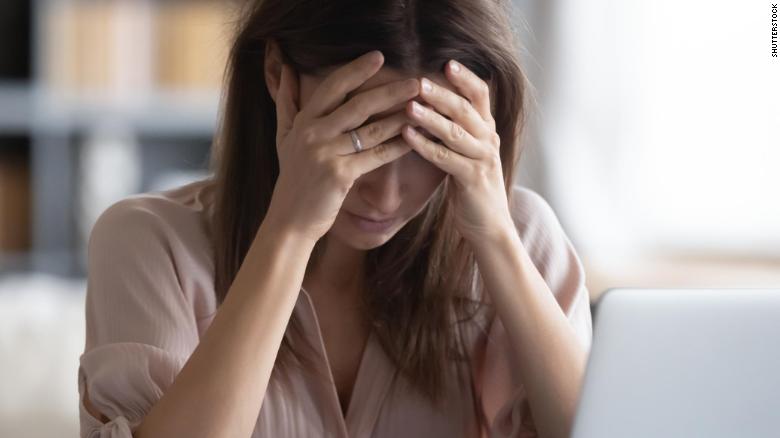Increased stress and depression due to covid-19 1:22
(CNN) -
If you're feeling anxious and depressed right now, you're not alone.
Psychological distress, depression and anxiety were prevalent in both men and women within half a year of the COVID-19 pandemic and well beyond the initial periods of confinement, according to a new article published this Thursday in the Lancet Regional. Health-Americas.
The study used data from 2,359 adults, a subset of participants from across the country who were enrolled in the American Cancer Society Cancer Prevention Study 3.
The researchers compared the data between two different time periods: 2018 and July to September 2020, to characterize levels of psychological distress.
What is depression?
Some tips to deal with this disorder and how to ask for help
The researchers found that 42% of the people in the study reported experiencing some mild psychological distress in the pandemic in 2020, compared with just 32% in 2018. 10% of the participants in the 2020 study had some moderate to severe anxiety or depression.
And depression was more common in those with pre-existing health conditions, such as cancer.
Emotions can turn to anxiety and depression when negative feelings don't go away after a short period of time, said Dr. Cynthia Ackrill, a certified stress management educator.
"If the worry involves more than the stressor, that's anxiety," said Ackrill, who was not involved in the study.
"If sadness is a state of mind that you cannot change beyond the situation, that is depression."
The researchers also found that women were more likely than men to report greater psychological distress during the pandemic, especially anxiety.
advertising
Why do women suffer more anxiety than men?
Women tend to be home caregivers, even when gender roles are more balanced than in the past, said John Duffy, a clinical psychologist and family therapist in Chicago, who was not involved in the study.
"They take on not only their fears, worries and anxieties, but also those of their environment," Duffy said.
Greater psychological distress before the pandemic was associated with higher levels of distress during the pandemic.
The researchers found that, in the case of men, elevated psychological distress before the pandemic was associated with an increase in depression of up to 11 times.
This compares with a 6-fold increase in depression for women who had elevated psychological distress before the pandemic.
"Higher levels of work-life balance stressors were more strongly associated with depression for women and anxiety for men; however, levels higher High financial stressors were more strongly associated with depression for men, "the researchers wrote.
During the pandemic, one or more financial stressors were more than twice as likely to suffer from some psychological distress.
The importance of seeking help
The researchers said their results underscore the need for health professionals to regularly assess mental health.
Depression and suicide: where to seek help in Latin American countries and Spain?
Mindfulness meditation can help people who are feeling stressed, said Dr. Alfiee Breland-Noble, a psychologist and founder of Project AAKOMA, a nonprofit organization dedicated to the mental health of young people.
One technique he recommended is to use your five senses to name an example of something you can see, something you can hear, something you can taste, something you can smell, and something you can touch;
Once you've named them, think of something you're thankful for.
"The concentration it takes to list each of these things is often enough to take our minds off what stresses us and into the moment," said Breland-Noble, who was not involved in the study.
What is anxiety, what are the symptoms, and how to seek help?
It's also important to participate in activities you used to enjoy before feeling distressed and to set aside time for self-care, Duffy said.
Some examples of self-care include journaling, walking with a friend, or watching a favorite TV show, she said.
If someone continues to struggle with their mental health, Duffy recommended that they seek professional support, such as going to therapy.
anxiety, depression, mental health

